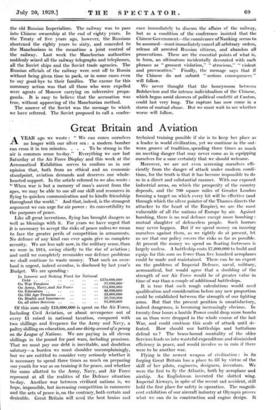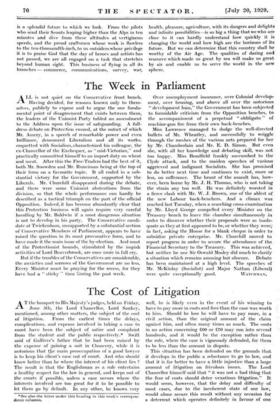Great Britain and Aviation
AYEAR ago we wrote : " We can cozen ourselves no longer with our silver sea : a modern bomber can cross it in ten minutes. . . . To be strong in the air is common sense to-day." Everything we saw last Saturday at the Air Force Display and this week at the Aeronautical Exhibition serves to confirm us in our opinion that, both from an ethical and an economic standpoint, aviation demands and deserves our whole- hearted support. In the article referred to we also wrote : " When war is but a memory of man's ascent from the apes, we may be able to use all our skill and resources in flying to quicken communication and to kindle friendship throughout the world." And that, indeed, is the strongest argument we can urge for air power : its convertibility to the purposes of peace.
Like all great inventions, flying has brought dangers as Well as blessings with it. For years we have urged that it is necessary to accept the risks of peace unless we mean to face the greater perils of competition in armaments. No defence of any kind can ever again give us complete security. We are less safe now, in the military sense, than we were in 1914, owing chiefly to the rise of aviation ; and until we completely reconsider our defence problems we shall continue to waste money. That such an over- haul is urgent, indeed overdue, is disclosed by last year's Budget. We are spending :
In Interest and Sinking Fund for Debt ..
On War Pensions On Army, Navy, and Air Force On Education ..
On Old Age Pensions ..
On Health and Insurances
On all other-Services ..
Of this sum only £19,000,000 is spent on the Air Force, including Civil Aviation, or about sevenpence out of every raised in national taxation, compared with two shillings and fivepence for the Army and Navy, a paltry shilling on education, and one-thirty-second of a penny on the League of Nations. We are paying in all eleven shillings in the pound for past wars, including pensions. That we must pay our debt is inevitable, and doubtless salutary—a burden we must shoulder uncomplainingly, but we are entitled to consider very seriously whether it is necessary to spend three times as much on preparing our youth for war as on training it for peace, and whether the sums allotted to the Army, Navy, and Air Force represent at all the realities of the Defence situation to-day. Another war between civilized nations is, we hope, impossible, but increasing competition in commerce and the arts of peace is, on the contrary, both certain and desirable. Great Britain will need the best brains and
National £370,000,000 .. 57,000,000 114,600,000 46,800,000 33,600,000 20,700,000 92,800,000
technical training possible if she is to keep her place as a leader in world civilization, yet we continue in the out- worn groove of tradition, spending three times as much on meeting danger that may never come as in equipping ourselves for a sane certainty that we should welcome.
Moreover, we are not even screening ourselves effi- ciently from the danger of attack under modern condi- tions, for the truth is that it has become impossible to do so in a direct and substantial manner. With our exposed industrial areas, on which the prosperity of the country depends, and the 700 square miles of Greater London forming a target on which every hit will be effective (and through which the silver pointer of the Thames directs the attacker to the heart of the Empire), we are the most vulnerable of all the nations of Europe by air. Against bombing, there is no real defence except more bombing : mutual slaughter of defenceless people. Such horrors may never happen. But if we spend money on insuring ourselves against them, as we rightly do at present, let us see that our policy covers the risks as far as possible. At present the money we spend on floating fortresses is largely useless. A battleship costs £7,000,000 to build and equip: for this sum no fewer than five hundred aeroplanes could be made and maintained. There can be no expert on the problems of Imperial Defence, naval, military, aeronautical, but would agree that a doubling of the strength of our Air Force would be of greater value in time of war than a couple of additional battleships.
It is true that such rough calculations would need qualification and consideration before any new proportion could be established between the strength of our fighting arms. But that the present position is unsatisfactory, indeed dangerous, is becoming increasingly obvious. In twenty-four hours a hostile Power could drop more bombs on us than were dropped in the whole course of the last War, and could continue this scale of attack until de- feated. How should our battleships and battalions defend us ? The brass-bound mentality of the older Services leads us into wasteful expenditure and diminished efficiency in peace, and would involve us in ruin if there were to be another war.
Flying is the newest weapon of civilization : in its forging Great Britain has a place to fill by virtue of the skill of her pilots, engineers, designers, inventors. We were the first to fly the Atlantic, both by aeroplane and airship. An Englishman invented the slotted wing. Imperial Airways, in spite of the recent sad accident, still hold the first place for safety in operation. The magnifi- cent exhibition of our aircraft industry at Olympia proves what we can do in construction and engine design. It is a splendid future to which we look. From the pilots who send their Scouts leaping higher than the Alps in ten minutes and dive from these altitudes at vertiginous speeds, and the proud craftsmen whose work is flawless to the ten-thousandth-inch, to us outsiders whose privilege it is to praise God that the day of heroes and artists has not passed, we are all engaged on a task that stretches beyond human sight. This business of flying in all its branches — commerce, communications, survey, war, health, pleasure, agriculture, with its dangers and delights and' nfinite possibilities—is so big a thing that we who are close to it can hardly understand how quickly it is changing the world and how high are the horizons of its future. But we can determine that this country shall be worthy of the Air Age. The qualities of daring and resource which made us great by sea will make us great by air and enable us to serve the world in the new sphere.

















































 Previous page
Previous page